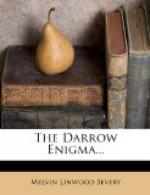Gwen looked at him inquiringly and he continued, answering the question in her eyes:
“This is what I mean. Your father, whether he committed suicide or was murdered, in all probability met his death through that almost imperceptible wound under his chin. This wound, so far as I have yet been able to examine it without a glass, was made with a somewhat blunt instrument, able, apparently, to little more than puncture the skin and draw a drop or so of blood. Of course, on such a theory, death must have resulted from poisoning. The essential point is: Where is the instrument that inflicted the wound?”
“Might it not be buried in the flesh?” Gwen asked.
“Possibly, but as I have not been able to find it I cannot believe it very likely, though closer search may reveal it,” replied Maitland. “Your father’s right forefinger,” he continued, “is slightly stained with blood, but the wound is of a nature which could not have been caused by a finger nail previously poisoned. Since we know he pressed his hand to his throat this blood-stain makes no more strongly toward the truth of the suicide theory than it does toward that of the murder hypothesis. Suppose now, for we must look at all sides of the question, the officers begin to act upon the assumption that murder has been committed. What will they then do? They will satisfy themselves that the east window was opened six and three-quarters inches and securely fastened in that position; that the two south windows were closed and fastened and that the blinds thereof were also closed. They will ascertain the time when death occurred,—we can easily tell them,—and this will show them that neither of the blinds on the south side could have been opened without so increasing the light in the room as to be sure to attract our attention. They will learn also that the folding doors were locked, as they are now, on this side and that these two gentlemen [indicating Browne and Herne] sat against them. They will then turn to the hall door as the only possible means of entrance and I shall tell them that the Doctor and I sat directly in front of this door and between it and Mr. Darrow. I have taken the liberty to cut the carpet to mark the positions of our chairs. In view of all these facts what must they conclude? Simply this: no one entered the room, did the deed, and then left it, at least not without being observed.” “But surely,” I ventured to suggest, “you do not think they will presume to question the testimony of all of us that no one was observed.”
“That is all negative evidence,” he replied, “and does not conclusively prove that another might not have observed what we failed to detect. However, it is all so self-evident that they will not question it. I know so well their methods of reasoning that I am already prepared to refute their conclusions at every point, without, I regret to say, being myself able to solve the mystery, though




